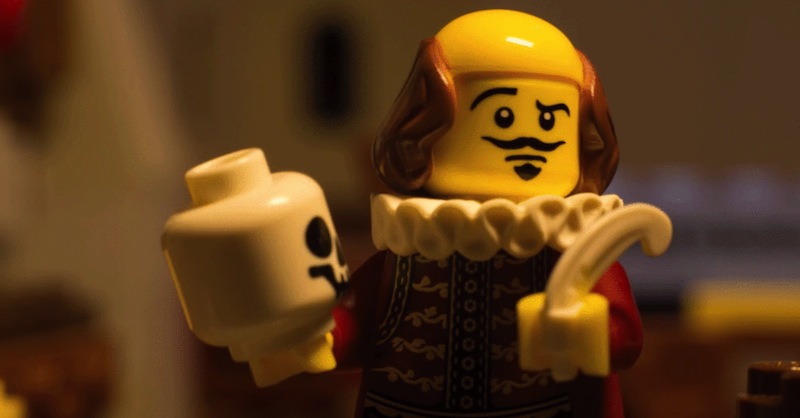We’ve been performing Shakespeare’s plays for 400 years, but we’ve been telling stories about the Bard himself for nearly as long. From a starring role in a big budget alt-history romance to a cameo appearance as a Master Builder in The Lego Movie, we relish the chance to rub elbows with “Shakespeare” in any number of unexpected settings. Below, we’ve gathered some of the best (and weirdest) stories that make merry with history and turn the Swan of Avon into a legend.
Shakespeare in Love
Shakespeare in Love imagines the Bard as a handsome young actor/playwright suffering from writer’s block and brooding over his new comedy, Romeo and Ethel, the Pirate’s Daughter. When he meets and falls in love with Viola—a wealthy noblewoman who’s disguised herself as a boy in order to act on stage—he uses their doomed affair as inspiration to rewrite the play as the tragedy, Romeo and Juliet. The film is largely unconcerned with historical or even literary accuracy, but it mostly all works thanks to cheeky references to Shakespeare’s body of work and Joseph Fiennes’ dreamy eyes.
The Stratford Man novels by Elizabeth Bear
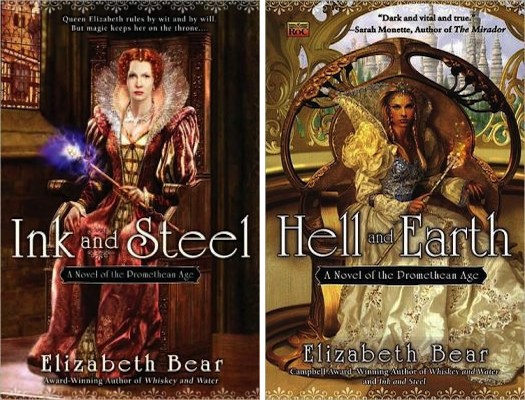
Part of the Promethean Age series, the Stratford Man novels (Ink and Steel and Hell and Earth) cast Shakespeare as a playwright working in the service of the Prometheus Club, a secret society of nobles engaged in battle against sorcerers determined to destroy England. When Queen Elizabeth’s personal spy, poet and playwright Christopher Marlowe, is murdered, his ability to weave sustaining magics into his plays is lost to the mortal realm. In order to save England, Faerie intervenes, raising Marlowe’s spirit as Mab’s servant—and Shakespeare’s ghostly teacher. Together they must navigate the intrigues of queens and courtiers in both realms to uncover the traitor in their midst.
The Simpsons: Treehouse of Horror III
Bart and Lisa accidentally raise the dead in “Dial Z for Zombies,” throwing the town of Springfield into chaos. Unfortunately, there’s a horde of undead between them and the book they need to counter the spell, including Albert Einstein, George Washington, and the withered corpse of the Bard, who pops out unexpectedly from a school locker. Homer, thrilled to finally be an action-hero, clubs him to the ground while shouting “Show’s over, Shakespeare!” Is this the end of Zombie Shakespeare? I sure hope not.
Sandman
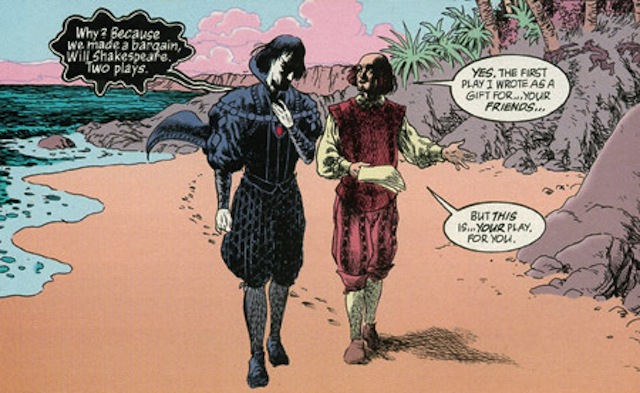
In Neil Gaiman’s epic comic series, Dream has a long-standing creative partnership with Will Shakespeare (alternatively spelled Shakespear and Shaxberd). The Bard makes a bargain to write two plays for the Prince of Stories—the first, A Midsummer Night’s Dream, is performed in the English countryside before an audience of bizarre creatures from Faerie, including the very characters who appear in the play: Titania, Auberon, Peaseblossom, and Robin Goodfellow/Puck. Dream later returns to Shakespeare in Sandman’s final issue to collect his second play. After a series of interludes on a mysterious island with monsters, sprites, gods, maidens, apparitions, and certain observations on English weather, Shakespeare fulfills his end of the bargain by writing The Tempest.
Marvel 1602: Fantastick Four
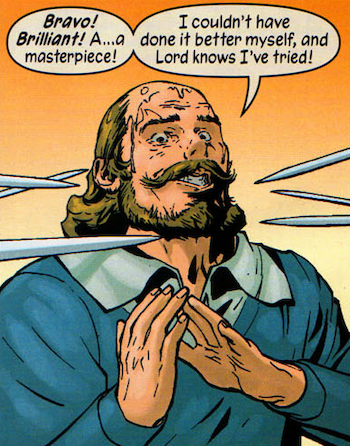
Neil Gaiman also penned this limited series set in an alternate timeline where Marvel superheroes exist in the Elizabethan era. In the 5-issue Fantastick Four arc, Shakespeare is kidnapped by the Vulture-Fliers and forced by Otto Von Doom to chronicle his journeys to the advanced city of Bensaylum (this reality’s Atlantis). Conveniently, one of the actors in Shakespeare’s company is Benjamin Grimm, who mounts a rescue with the rest of the Fantastick Four. The day is mostly saved and Shakespeare is returned to London to complete his work on Macbeth—possibly with a few additions based on his time with Von Doom. But the best part? The Bard steals the love interest of noted ladies’ man Jonathan Storm, scoring a win for balding playwrights everywhere.
Doctor Who: “The Shakespeare Code”
The Doctor and his newly minted companion Martha meet a rather roguish (and apparently bisexual) Shakespeare as he is busy putting the final touches on Love’s Labour’s Won—historically rumored to be a lost work, and a presumed sequel to Love’s Labour’s Lost. Before long, Martha and the Doctor discover that Will has been unknowingly coerced into writing the play by a trio of witches Carrionites, an alien species for whom words are a powerful form of magic, and who intend to use the play’s performance to break their species out of eternal imprisonment. Luckily Shakespeare is able to stop their plot by improvising a bit of linguistic magic of his own, with a bit of help from Martha and a well-timed “Expelliarmus.”
Peabody & Sherman
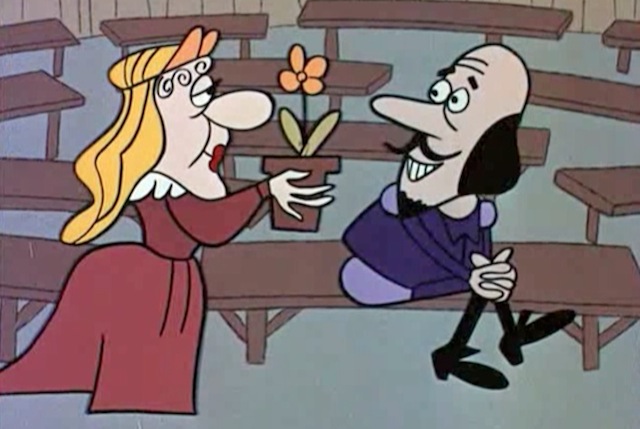
The “Peabody & Sherman” shorts in Rocky & Bullwinkle tend to be pretty liberal with its take on “history,” so it’s not surprising that their meet-up with the Bard is rather outlandish—though it does play with the (unfounded) conspiracy theory that Shakespeare is not the real author of his plays. Mister Peabody and his boy, Sherman, use the WABAC Machine to travel to Warwickshire in 1611 where they “help” Shakespeare with the first production of Romeo and Zelda. (Sure the timeline’s a little off, but just go with it.) During rehearsal, the actor portraying Zelda smashes a flower pot over the poor Bard’s head before revealing himself as Francis Bacon and accusing Shakespeare of plagiarism. It just gets weirder from there, but at least Peabody is able to convince Shakespeare to rechristen his leading lady “Juliet”.
Bill
There has been much speculation about Shakespeare’s “lost years”, a 7-year period where the Bard largely disappears from the historical record before emerging somewhat suddenly on the London theatre scene. The folks behind Horrible Histories take this opening and run with it in Bill, a comedy that casts the young playwright as a hopeless lute player pursuing his dreams—only to get caught up with murderous kings, spies, lost loves, and a plot to blow up the Queen…
Kill Shakespeare
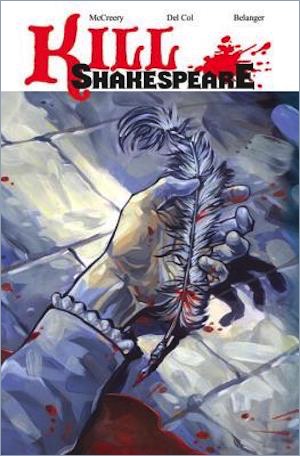
This short comic series by Anthony Del Col and Conor McCreery drops some of the Bard’s most well-known characters into a sword & sorcery-style world. Richard III offers Hamlet the chance to resurrect his father, so long as he can find the reclusive wizard Shakespeare and steal his magic quill. Unsurprisingly, Richard and his right-hand man Iago have nefarious plans for the quill, but luckily Hamlet is spirited away by Falstaff, a member of the underground rebellion led by Juliet and Othello. Slotted in to the role of wise mystic / Macguffin of the quest, Shakespeare himself doesn’t appear till after the half-way mark—and even then he seems pretty uninterested in the whole affair…
“We Haven’t Got There Yet” by Harry Turtledove
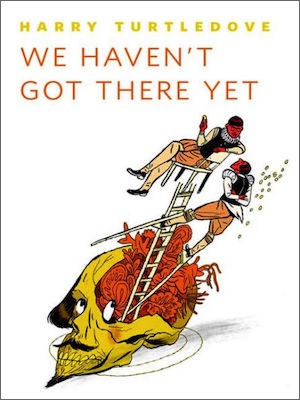
In 1606, Shakespeare is enraged to learn of a new play staged at the Rose that pilfers from his own Hamlet—Tom Stoppard’s tragicomedy Rosencrantz & Guildenstern Are Dead. Shakespeare attends the play, and though initially confused by its existential and absurdist style (not to mention the bare prose), he comes to appreciate Stoppard’s critiques regarding his own use of minor characters as props. After bribing his way backstage, the Bard learns what the reader already suspects: the acting company are time travelers, although accidental ones, who simply continue performing the plays they know best for their new Elizabethan audiences.
Blackadder Back & Forth
The final installment in Rowan Atkinson’s epic comedy series, Back & Forth sends the modern Lord Blackadder on a trek through British history after his fake time machine (built to trick his “friends”) turns out to actually work. After narrowly escaping the wrath of Queen Elizabeth I, Blackadder literally runs into a haggard Shakespeare, scattering his manuscript for Macbeth. After getting the Bard’s autograph, Blackadder punches him in the face as payback for all the school children forced to suffer through his plays, then kicks him in recompense for Branagh’s “endless, uncut, four-hour version of Hamlet.” Well, that one’s hardly his fault…
Superman comics
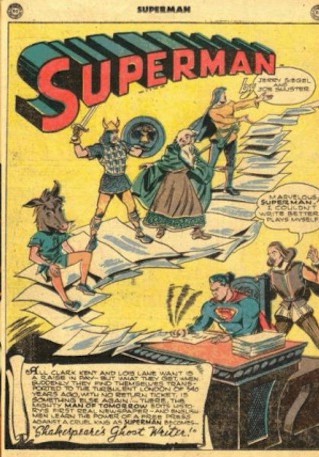
In issue #44 (1947), Clark Kent and Lois Lane meet Shakespeare when they’re accidentally zapped back to 17th century London—marking the first time Supes time travels. Lois is (of course) kidnapped and so Superman has to save the day, though she somehow remains clueless to Superman’s true identity. Shakespeare, however, solves the mystery in about 30 seconds and plans to use the hero as inspiration for his next play. Thinking quickly, and with no regard for the glaring time travel paradox he’s creating, Clark recounts the story of Macbeth and convinces Shakespeare to use that plot instead. It seems odd that Supes chooses one of the Bard’s darkest plays, and not a comedy that includes themes of secret identities—like Twelfth Night, for instance—but what do I know.
Twilight Zone: “The Bard”
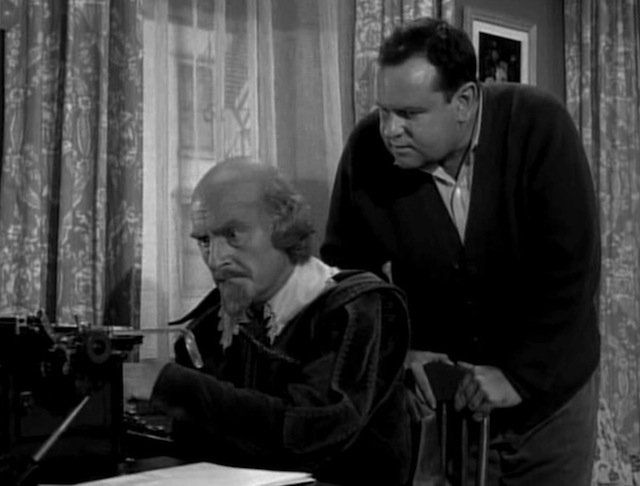
In a rare comedic episode of the Twilight Zone, a bumbling screenwriter is in desperate need of a brilliant TV pilot script for a show about practitioners of black magic. While researching the topic, he finds a book with an actual spell that he uses to bring Shakespeare to the modern day. Shakespeare produces a riveting screenplay for the writer, but is so horrified at the revisions suggested by both the network and the sponsor that he assaults the leading man (played by Burt Reynolds!) and storms out for good. It’s kind of fantastic, even more so because it’s clearly Rod Serling’s not-so-subtle way of sticking it to the higher-ups at CBS.
Upstart Crow
Blackadder writer Ben Elton returns to the Elizabethan Age with this sitcom set at the beginning of Shakespeare’s career. The series focuses on both Will’s family and professional life, remixing his body of work and (some) actual history with classic sitcom conventions. In each episode, the future-Bard contends with resentful relatives, subversive servants, and royal censors—and the killer Stratford-to-London commute. The show gleefully skewers Shakespeare’s genius and uses playful anachronism to keep Tudor England relatable to modern audiences—there’s even a 2020 Christmas special that sees Will trapped inside during the plague of 1603…
Captain America comics
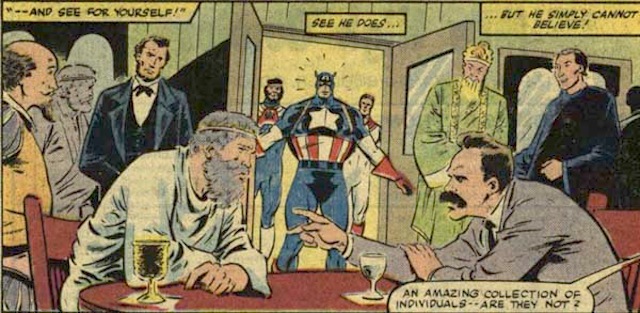
In Captain America #269 (1982), Cap is participating in a motorcycle exhibition (what?) along with a crew of stunt performers called Team America (why?). The show is interrupted when a giant teleports into the arena and kidnaps fictional Nobel Prize winner Alfred Knopfler (WHAT?). Cap and the stunt team follow, finding themselves in a town populated by android duplicates of great thinkers from throughout history, including Confucius, Mark Twain, and of course, Shakespeare. The Mad Thinker created the androids to keep him company, but grew bored when they couldn’t offer him any new knowledge, hence the kidnapping of modern Nobel laureates. Cap and his Evel Knievel buddies bust the place up, destroying most of the ‘bots in the process—Cap pretty much puts his fist through Shakespeare’s face, so, yikes.
As a much nicer but no less perplexing follow-up, the Twain-bot asks Vision for help in issue #129 of Marvel Team-Up (1983); Twain has patched up his robo-brethren as best he can (Shakespeare is still missing his face, though), and they all hope that Vision, as a living, thinking android, can help them better understand the modern world.
Will Shakespeare
This 1978 British miniseries may have kick-started the trend of sexing up Shakespeare, but who can blame them for just letting Tim Curry be his sultry self? Like Shakespeare in Love, the series suggests that Shakespeare’s personal life heavily influenced his writing, and each episode chronicles the (largely fictional) events that found their way into his plays, from a supposed apprenticeship with Christopher Marlowe (played by Ian McShane), a homoerotic relationship with the Earl of Southampton, and a dalliance with a “Dark Lady” from the upper class.
The Librarians
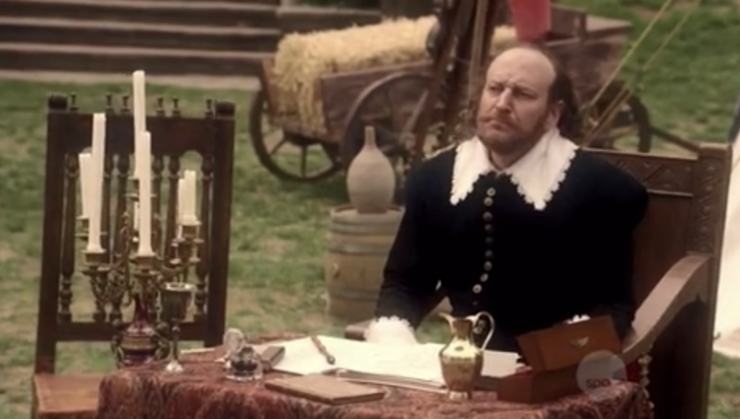
The Librarians film- and TV-series centers on an ancient organization dedicated to protecting the world from various supernatural threats—including the Shakespearean wizard Prospero, who intends to change the ending of The Tempest so that he may keep his supernatural powers. With the help of Moriarty (naturally), Prospero remakes his magic staff and starts wreaking havoc on the world. Two of our heroes travel back in time to stop him (it’s complicated), encountering a possessed Shakespeare with a new play: The Triumph of Prospero…
Discworld
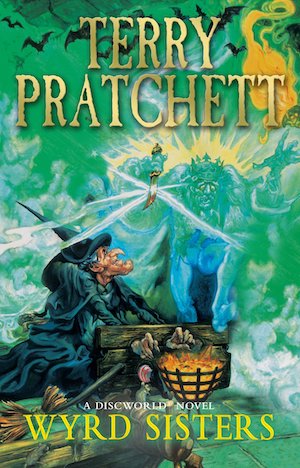
First encountered in Wyrd Sisters, the dwarf Hwel is the most gifted playwright on the Disc. His plays often take on a life of their own, sometimes even disconcerting Death himself. For instance: Hwel wrote a play meant to celebrate the marriage of the King and Queen of Lancre, which accidentally summoned Elves to the kingdom and brought about no end of bother until Granny Weatherwax sorted it out. The play in question has not been performed since, as Hwel is looking for a snappier title than Things Which Happened On A Midsummer’s Night…
Gnomeo and Juliet
https://www.youtube.com/watch?v=uwajSVAV0zc
In possibly the strangest Shakespeare adaptation, the garden gnomes of warring neighbors Mrs. Montague and Mr. Capulet come to life at night, and carry on their gardeners’ feud. But despite being on opposite sides of the fence, Gnomeo and Juliet fall in love after a chance meeting. It’s bizarre and unexpectedly dark (Tybalt accidentally destroys himself while trying to murder Gnomeo; a plastic flamingo is permanently separated from his wife when their human owners divorce), but things get super meta when Shakespeare himself—or rather a talking statue of him, voiced by Patrick Stewart—shows up. He tells Gnomeo the ending of the original tragedy, and admits that while it might be possible to set things right this time, he personally “likes the whole death part better.” So good luck, little guy.
Honorable Mention: A Midsummer Tempest by Poul Anderson
Although Shakespeare himself does not appear in the novel, Anderson’s work takes place in a parallel universe in which William Shakespeare was not “the Bard” but “the Great Historian,” and all the events depicted within his plays were accounts of historical fact, not fiction. Set during the English Civil War (about two decades after Shakespeare’s death), the struggle between the Roundheads and the Cavaliers is complicated by the very real existence of Prospero’s magic books.
***
That’s far from all of Shakespeare’s fictional appearances—either as comic relief, swarthy love interest, savior of England / the world, champion of the English language and the arts, or that one weird robot version—so let us know which of your favorites we’ve missed in the comments!
Originally published in April 2016.










